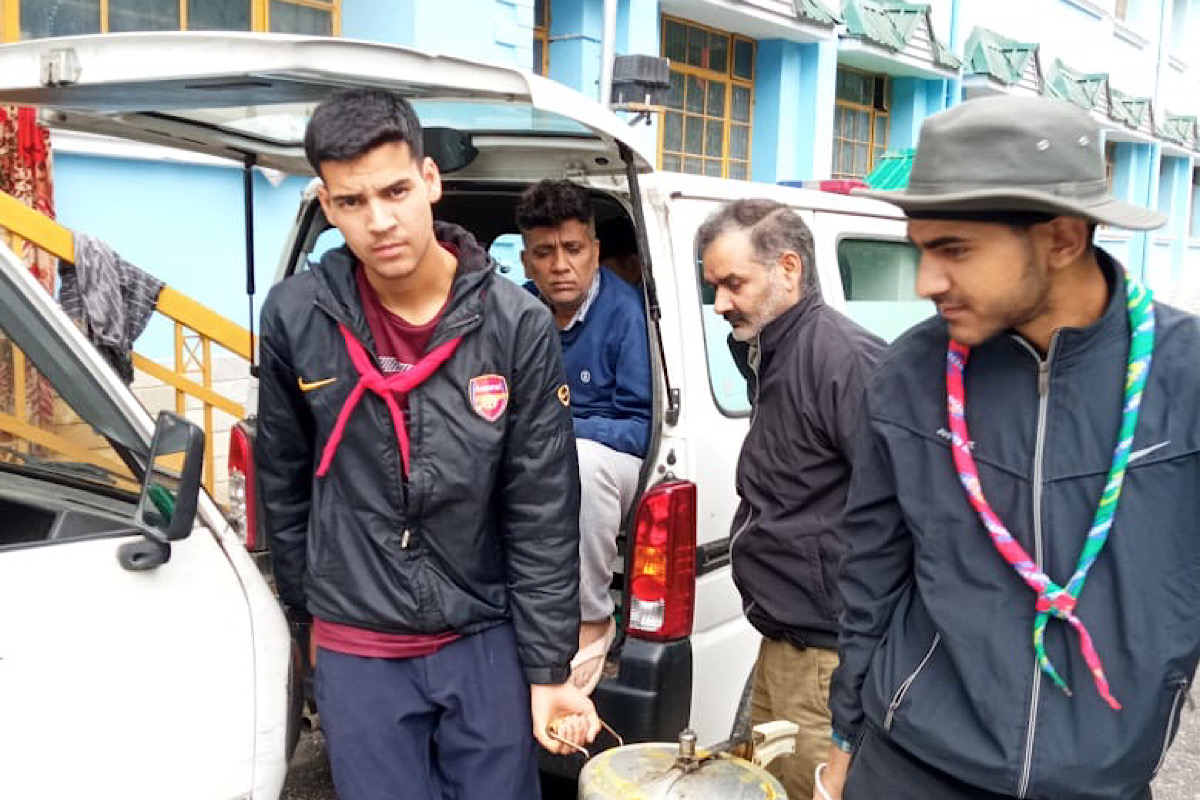Sunny Deol turns ‘snowman’ in these holiday pics from Manali
Taking some time off his busy schedule, Sunny Deol decided to blow off some steam in Manali. The 'Gayal' actor dropped some sneak peeks from his time in the hills on social media.
Days after the monsoon and flash floods played havoc with the lives of locals and tourists, instances of opportunism and greed where local traders, hotel owners or cab drivers were seen making exorbitant demands for consumables or travel came to light in the townships.

Visuals from the Spot (Photo:SNS)
Days after the monsoon and flash floods played havoc with the lives of locals and tourists, instances of opportunism and greed where local traders, hotel owners or cab drivers were seen making exorbitant demands for consumables or travel came to light in the townships.
With no power and internet for about three to four days, several tourists soon after arriving at the safer places in and around the small markets of Bhuntar, Kullu, and Manali were seen queuing up to look for a place to charge their mobile phones. Most of them were only too happy to pay Rs 100 to recharge and get their lifelines (charged phones) back.
Advertisement
With no internet services, the digital transactions had stopped and most of the tourists were left with no cash. The arguements between the shopkeepers and the visitors were a common site.
Advertisement
But despite all this, there were heartwarming acts of kindness by several good samaritans that left a deep impression among the tourists who travelled out of the rain-ravaged state to safer places and some even reached back to their homes well in time.
“We were staying in a hotel by the riverside near Manali. After the administration’s warning, the hotel owner requested us to vacate the premises. She not only took our bank account details to return our money but also accompanied us to ensure that we got a safer place to stay,” said Naveen Sharma, a resident of Ludhiana.
Amit Hora, a Chandigarh-based businessman, who along with his family and friends remained stranded in a hotel in Palchang, a few km from Manali for five days, recalls that despite a complete black-out for almost three days, the hotel owner and the staff took care of all the families. “Most of us did not carry much cash and when the hospitality staff brought this issue up with the owner, he came to us and assured us that we could stay there and make the payments later when we reached our homes. He ensured that all the occupants had food and water despite complete disruption of power and water supply,” he said.
He mentioned that as the roads have not been completely restored, the owner even offered to suggest a safe place where the tourists could leave their vehicles and leave.
Some tourists, however, who hired cabs to travel down to nearby towns of Mandi or towards Chandigarh had to pay four to five times the fare.
Rahul Mantri, a businessman from Jaipur who had come to Manali with his wife and made it to Chandigarh in a cab, said that the cab operators raised cab fares to Rs 18,000 for dropping them from Manali to Chandigarh. “We come every year to Manali. Luckily, we could trace our regular cab wallah, who after negotiation agreed to drop us for Rs 13,000,” he mentioned. On usual days, travellers pay anything between Rs 5,000 to 7,000 depending upon the vehicle from Manali to Chandigarh.
While cab operators and other local traders reasoned out that they were demanding a higher price for the huge risk they were taking to ferry the passengers, they also claim that they have to save something for the future as the business scenario looks gloomy for the next few months till the roads are repaired.
But several local residents disagree with them and are peeved that this greed for money was bringing a bad name to the entire region.
“We are here to help them and not to take advantage of their sufferings,” says Vinit Sood, a Kullu-based trader, who along with a few other volunteers was found distributing fruits and water bottles to the tourists stuck in a traffic jam near Raison, Kullu.
Vineet, along with a few other locals who are active volunteers of a local NGO Annapurna Charitable Society, has been serving the local shanty dwellers, who were displaced following the floods in Beas. “This is the least we can do to serve our fellow beings. With no supply of bananas, we were left with no other option but to distribute biscuit packets to the travellers along with water. We just wanted them to find a safe way to their homes,” he signs off while rushing with a heavy box towards the caravan of vehicles moving at a snail’s pace on the rain-ravaged road on the left bank of Beas.
Authorities maintained that till now over 70,000 tourists and locals have been evacuated from the rain-hit areas of Kullu, Manali and Lahaul Spiti districts.
Chief Minister Sukhvinder Singh Sukhu said, ”About 500 tourists have voluntarily stayed back. About 15,000 vehicles have been pulled out and electricity, water and mobile services have been temporarily restored in 80 per cent of the disaster-hit areas.”
According to him, among those who have been evacuated are also foreign nationals. “There are several Israeli and other nationals who are reluctant to leave Kasol and nearby areas,” he said.
Tomorrow-No lessons learnt
Advertisement